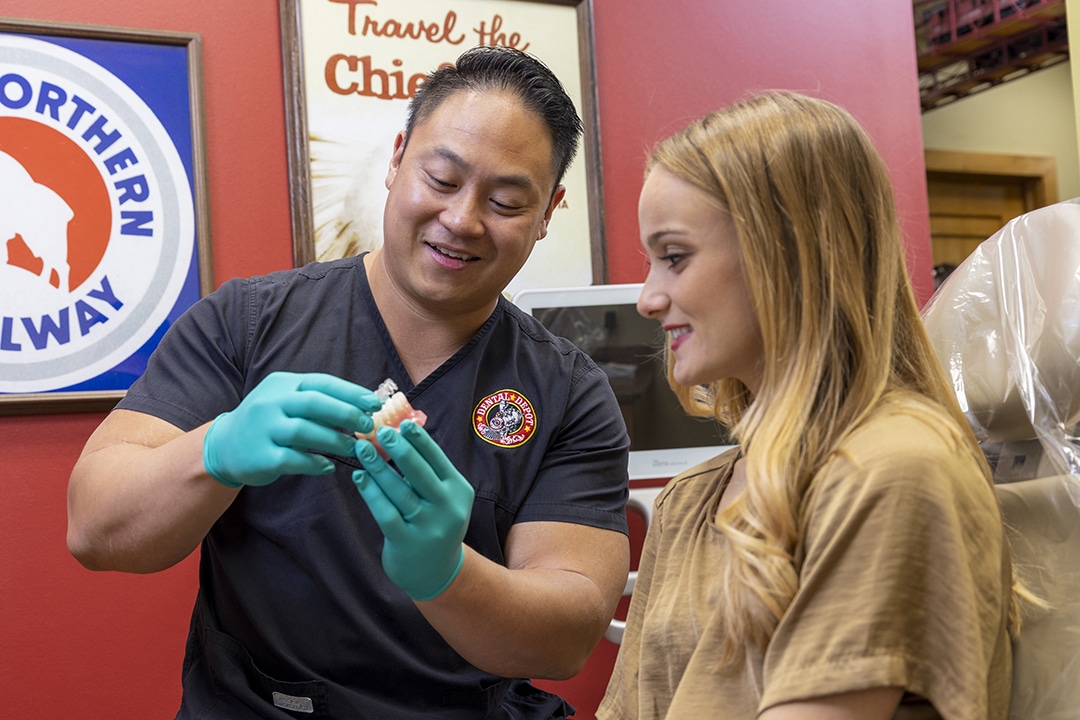Dental crowns and bridges are restorative dentistry options to replace or reinforce missing or damaged teeth. They are fixed prosthetic devices that help maintain the aesthetics and functionality of a full mouth of teeth.

A dental crown is an artificial tooth made of ceramic or porcelain. It is a fixed prosthetic device used in restorative dentistry to protect or replace a damaged, fractured, or missing tooth. Crowns look, feel, and function like natural teeth.
A crown is ideal for situations such as:
A bridge is essentially a set of crowns to replace gaps where multiple teeth are missing. Artificial teeth are attached between two crowns, and the crowns are fitted over the teeth on either side of the gap, “bridging” the empty area. Once cemented into place, bridges—like crowns—look, feel, and function like natural teeth.
A bridge may be an alternative to dentures or implants, when dentures are uncomfortable, unstable, or undesirable, or if the existing jawbone and gum structure cannot support implants.
Crowns also serve as anchors for dental bridges or to cover dental implants.
For children, pediatric dentists will sometimes recommend stainless steel crowns to cover baby teeth. This may be ideal in situations when:
Fillings address small areas of decay or damage. The decayed area of the tooth is removed and the filling is placed in the remaining space, retaining the rest of the natural tooth.
Crowns are used for more serious damage or decay, such as when a filling is insufficient to repair and restore the tooth, and fit over the existing tooth. Crowns can be used alone or combined with a filling.
Crowns can also be used in conjunction with dental implants. Dental implants consist of three parts: the implant, which is embedded in the jaw under the gumline and fuses to the jawbone; the abutment, which connects to the implant through the gumline and is slightly visible above the gum; and the crown, which attaches to the abutment. Crowns can be attached to the abutment with dental cement or screws.
There are several types of materials used to make crowns, including composite resin, ceramic, porcelain, porcelain fused to metal, or metal alloys. Whatever the material, however, it is typically colored and shaped to match the rest of your teeth.
Used when there are still natural teeth on both sides of the gap, traditional bridges are secured by dental crowns that have been cemented to the existing teeth.
A cantilever bridge only requires one natural tooth next to the gap. Like a traditional bridge, it is secured with a dental crown cemented to the natural tooth.
Similar to traditional bridges, Maryland bridges require two natural teeth on either side of the gap to secure the crowns. However, unlike traditional bridges, Maryland bridges use either metal or porcelain frames to bond the crowns to the back of those natural teeth.
Implant-supported bridges are attached to the metal abutments of dental implants.
A crown or bridge procedure usually takes at least 2 dental visits. At the first visit:
If you had to wait for your new crown, you will have a second appointment, during which the dentist will place and adjust the crown before cementing it permanently into place.
Depending on the material used and the size and condition of the tooth, crowns can range anywhere from $800 to $1500 or more. Metal crowns are typically less expensive than gold or porcelain. Other costs that may impact the price you pay include any prep work required before placing the crown, such as dental implants or a root canal.
Dental bridges range in price from $2,000 for traditional or cantilever bridges with one crown to $15,000 for an implant bridge that spans three or four teeth.
Your dental insurance plan may cover part or all of the cost of your crown treatment, but only certain types of crowns. Be sure to check with your dentist and your insurance company to find out what is covered and what you may be responsible for out-of-pocket.
Dental Depot DFW’s team of dental professionals includes oral and maxillofacial surgeons as well as prosthodontists, experts who specialize in tooth restoration and replacement. Dedicated, on-site specialists mean that you receive exceptional, comprehensive care for all of your dental needs with the convenience of one location. From cleanings and checkups to fillings and crowns, Dental Depot DFW provides the continuity of care you deserve for a lifetime of oral health. Visit one of our Dental Depot locations near you in Dallas, Lewisville, Aubrey, The Colony, McKinney, Arlington, or Highland Village and take advantage of our flexible schedule and Saturday appointments to schedule care that fits in your busy life.
